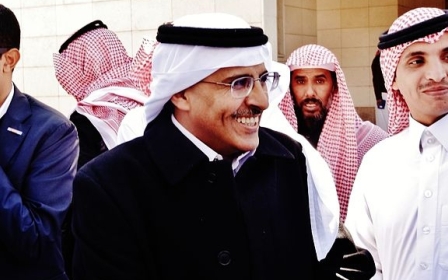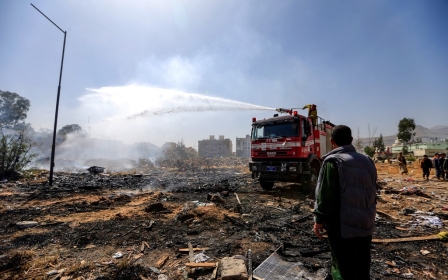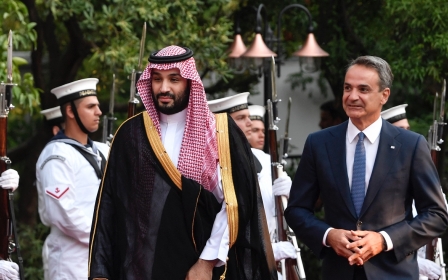Neom: Saudi Arabia jails nearly 50 tribespeople for resisting displacement

At least 47 members of the Howeitat tribe in Saudi Arabia have been either arrested or detained for resisting eviction to make way for the Neom megacity, according to a new report.
Human rights organisation, Alqst, published "The Dark Side of Neom" on Thursday, outlining the names of all those detained or disappeared for speaking out against the project, and detailing human rights abuses committed against evictees.
The $500bn new Saudi megacity - which organisers claim will be 33 times the size of New York City - is planned to include a 170km straight-line city, an eight-sided city that floats on water, and a ski resort with a folded vertical village, among other grandiose and architecturally challenging projects.
The project is being built in the Tabuk province of northwestern Saudi Arabia, where the displaced Al-Howeitat tribe had, until recently, lived for centuries.
The report found that 15 members of the tribe had been sentenced to between 15 and 50 years in prison, while five were sentenced to death. A further 19 were detained with no further information on their fate, while eight were released.
New MEE newsletter: Jerusalem Dispatch
Sign up to get the latest insights and analysis on Israel-Palestine, alongside Turkey Unpacked and other MEE newsletters
The report notes a marked extension in jail sentences since mid-2022, coinciding with the rehabilitation of Saudi Crown Prince Mohammed bin Salman within the international community, following years of diplomatic isolation in the aftermath of the murder of journalist Jamal Khashoggi in the Saudi consulate in Istanbul.
"The correlation is clear," Lina al-Hathloul, head of monitoring and communications at Alqst told Middle East Eye during the launch of the report in London. "It's clear that the more [Crown Prince] MBS is rehabilitated, the worse things get".
Sentences extended
Abdulilah Rashid Ibrahim al-Huwaiti and Abdullah Dakhil Allah al-Huwaiti were both sentenced to 50 years in prison and a 50-year travel ban for supporting their family’s refusal to be forcibly evicted to make way for the construction of Neom, as MEE reported in September.
Maha Suleiman al-Qarani al-Huwaiti, the only known woman among those detained, was arrested in February 2021 for tweeting about the cost of living and mourning the death of Huwaiti.
She was initially sentenced to one year in prison, which was increased to three years on appeal. In August 2022, in violation of Saudi law, she was retried on the same charges and sentenced to 23 years in prison.
'These harsh punishments inflicted on members of the Huwaitat tribe are part of a wider trend'
- Human rights group, Alqst
In April 2020, tribal activist Abdul-Rahim al-Howeiti was shot dead shortly after making videos protesting against his eviction to make way for the megacity.
Ahmed Abdel Nasser al-Huwaiti, nephew of Abdul-Rahim, was arrested in October 2020 for expressing sympathy for his uncle’s death and “seeking to destabilise and disrupt the social fabric and national cohesion”, according to the report.
He was initially charged with five years in prison, which was increased to 21 years upon appeal.
Among the five known to be sentenced to death is Shadli Ahmed Mahmoud al-Huwaiti, brother of Abdul Rahim.
Shadli was initially forcibly disappeared for two months in late 2020, before being charged with “establishing a terrorist organisation to rebel against the ruler” and “creating a Twitter account to tear apart national cohesion”.
In May 2022, he went on a hunger strike after being placed in solitary confinement in Dhaban Prison and was then force-fed via a tube in his stomach.
“These harsh punishments inflicted on members of the Huwaitat tribe are part of a wider trend that began in the summer of 2022, of individuals being sentenced to lengthy prison terms - of up to 50 years - simply for social media activity calling for social and political reform,” the report said.
It noted that Saudi authorities had “dramatically increased” the use of the death penalty in 2022, compared to 2021, executing twice as many people.
“These developments, taken together, represent a sharp deterioration in the human rights situation following the normalisation of diplomatic relations with Mohammed bin Salman,” Alqst said.
Hathloul told MEE that following visits by former UK Prime Minister Boris Johnson and US President Joe Biden to Saudi Arabia last year, there was "a mass wave of executions" and "lengthy sentences that were unprecedented".
"The government doesn’t even want to hide it, it’s been clear to the people: I have a green light to repress you. You are muzzled and the world is protecting me."
Evictions breach international law
The report lays out how authorities evicted residents, often against their will, in contravention of international law.
In March 2020, authorities sent in special forces, sometimes 40 vehicles at a time, to raid the homes of those resisting eviction and intimidate them.
Saudi forces arrested 20 residents for coming to the defence of a kidnapped child, the report said. The minor was allegedly abducted by secret police after he wrote the slogan “We will not be moved” on walls.
The report revealed that financial incentives of up to 100,000 riyals were offered to state-appointed tribal leaders on the condition that they publicly condemned Abdul-Rahim’s resistance to eviction.
Meanwhile, authorities rejected some locals' requests to be resettled in close proximity to their former homes, and instead offered 620,000 riyals in compensation to be rehoused further away. In reality, though, Alqst reported, recipients were offered as little as 17,000 riyals.
Most evictees were forced to buy homes in poorer neighbourhoods in the Tabuk province because of the low compensation received, it added.
The expropriations of homes contravene the Universal Declaration of Human Rights and the Cairo Declaration on Human Rights in Islam, both of which Saudi Arabia has ratified, according to the report.
Alqst found that authorities acted in a discriminatory manner against tribespeople and did not respect due process, in violation of several international conventions.
The report notes that several global companies have provided consultancy services and signed contract agreements with Neom, and therefore “bear a solemn corporate human rights responsibility”.
“ALQST calls on businesses involved in Neom to…reassess your involvement in the Neom project, and be prepared to cease your engagement, unless and until the adverse human rights impacts can be addressed,” it stated.
Among the companies said to be involved in Neom are Boston Consulting Group, McKinsey & Co, Samsung, and Oliver Wyman.
Middle East Eye delivers independent and unrivalled coverage and analysis of the Middle East, North Africa and beyond. To learn more about republishing this content and the associated fees, please fill out this form. More about MEE can be found here.





